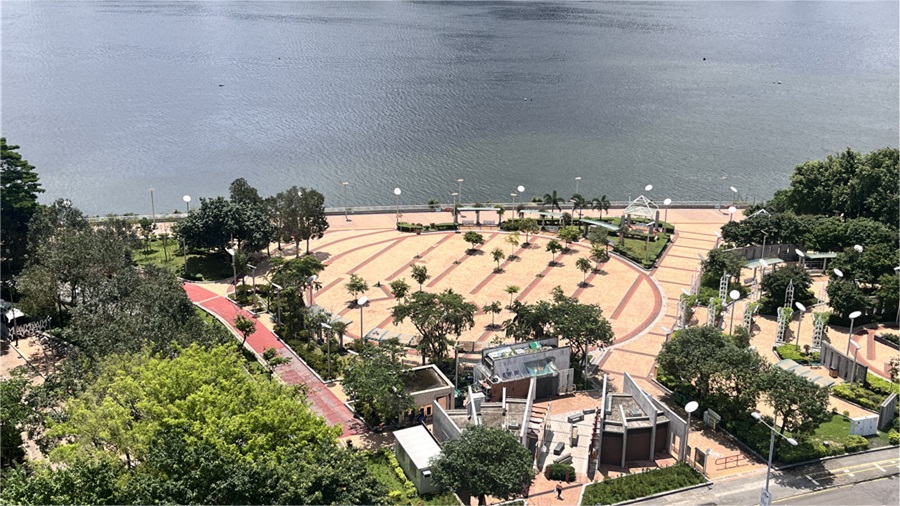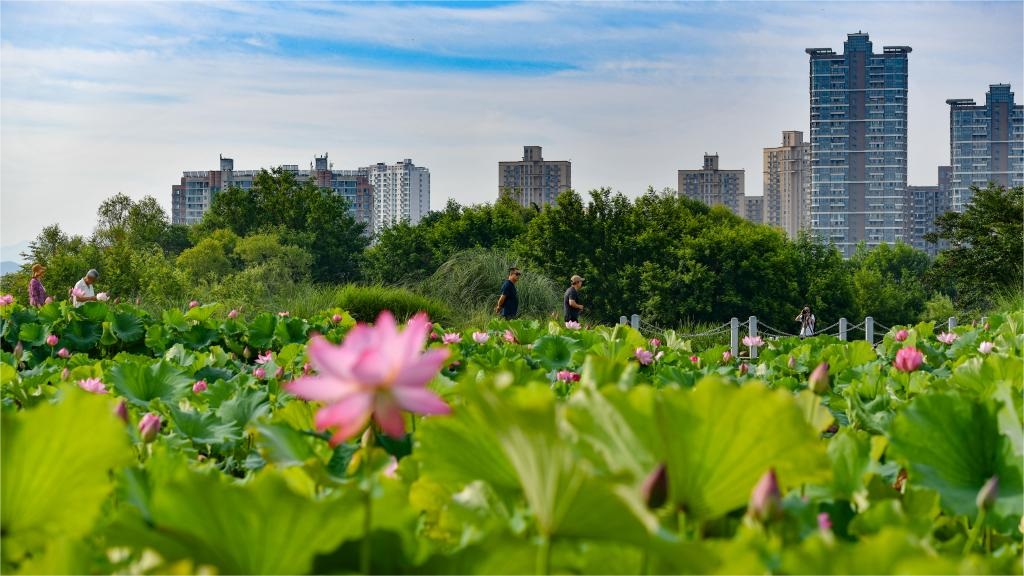Hong Kong's 'pay-as-you-throw' waste disposal put on hold
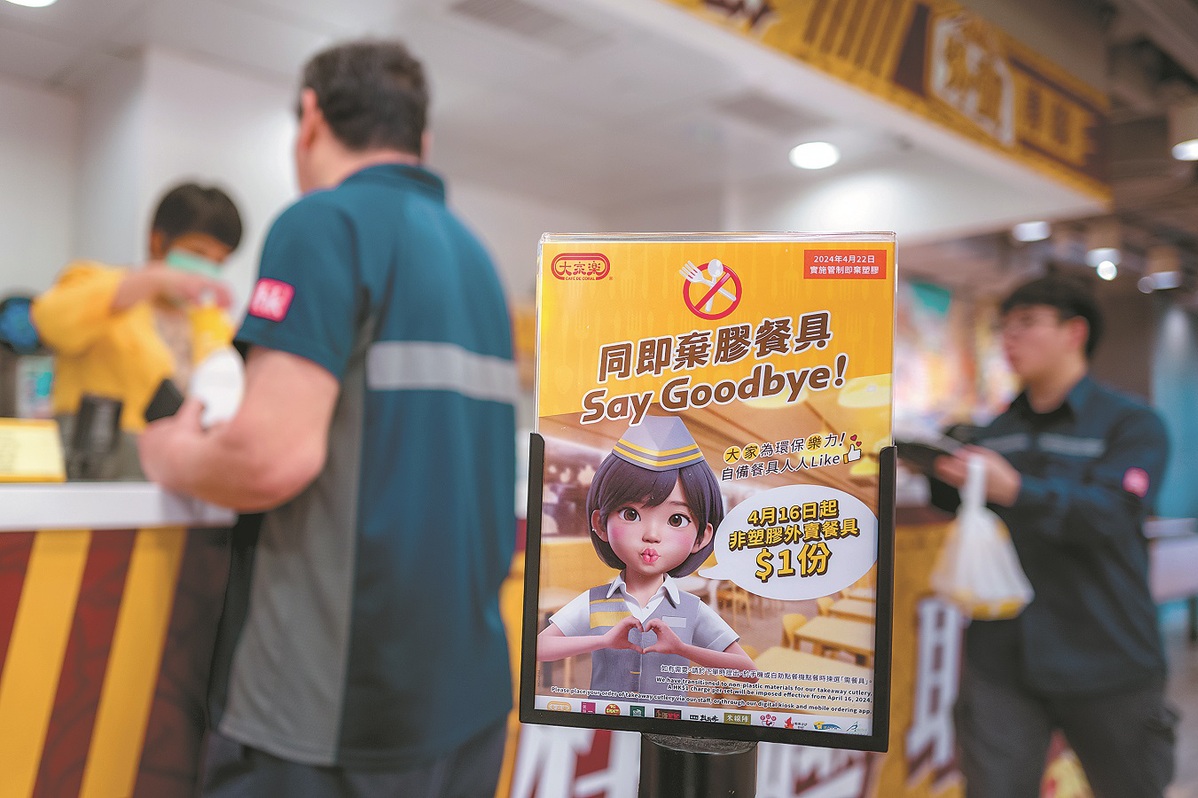
Residents purchase takeout from a restaurant at Admiralty, Hong Kong, in April, as the city began to enforce the first-phase ban on disposable plastic products in restaurants and hotels. (ANDY CHONG/CHINA DAILY)
Cleaner Lau Mui-chun, 69, breathed a sigh of relief last month after hearing that the Hong Kong Special Administrative Region government had decided to shelve the city's waste-charging program, which it had already postponed twice.
Lau looks after 34 levels of a residential building in Kowloon, cleaning the corridors and trash room on every floor, and carrying household waste to the garbage collection point on ground level.
A cleaner for over 30 years, she understands that the "pay-as-you-throw" program is a key initiative for the city's waste reduction, which will eventually cut her own workload. Yet her anxieties escalated as Aug 1, the official implementation date for the program, approached.
Lau found that she knew little about the program, let alone what she should do if someone does not comply with the new regulations — such as refusing to put waste in prepaid rubbish bags for disposal.
"My company has never offered any guidance, and no organization has reached out to us to explain relevant policies," Lau said, adding that all her knowledge about the program comes from talking with colleagues who garnered most of their information from TV programs.
Even cleaning workers who took part in an eight-week trial run, which covered 14 buildings, nursing homes and restaurants, told a government survey that they needed more time to adapt to the program. They also said they were worried about potential conflicts if residents did not follow the regulations.

Students participate in educational activities on waste reduction and the city's waste-charging plan at a primary school in HK on Jan 16. Multiple booths were set up in the school hall to demonstrate ways to reduce waste at the source and promote recycling. (CALVIN NG/CHINA DAILY)
Clearer guidelines
The front-line cleaners' confusion helps explain why Hong Kong's ambitious waste-charging program has been pushed into a tight corner.
The program requires residents to use designated garbage bags, which are eco-friendly and priced between HK$0.30 (3.8 US cents) and HK$11, to discard rubbish. For oversized waste, users will need to attach a label costing HK$11 to each item before it's disposed.
The Hong Kong government launched a small-scale trial run of the program on April 1, hoping to garner feedback and publicize it.
However, problems raised during the trial, such as low use of the prepaid bags, lack of education about the program, and concerns about the expense — along with considerable criticism from the general community — forced the government to shelve the program on May 27.
The full program was originally scheduled to begin in late 2023 but was postponed to April 1, and then Aug 1. Government officials are now looking at ways to optimize it before its implementation.
Cleaners like Lau are concerned about the guidelines on dealing with violations and believe breaches are bound to happen at the beginning of the program. For example, Lau asked, should she stop or report people who fail to comply with the program? Will she bear any responsibility if she fails to prevent or report such acts? And, if she has to repack improperly discarded trash with the designated bags, who will pay for the bags?
The additional workload and responsibilities for cleaners under the program deserve a salary hike, Lau added.
Chan Kam-wah, vice-chairman of the Hong Kong Environmental Services, Logistics and Cleaning Employees Association, said grassroots cleaners face pressure from residents and are wary of their legal obligations. They may have to take responsibility for residents' actions and end up unintentionally breaking the law, he said.
Cleaning workers are in urgent need of guidance on the new program, similar to that the HKSAR government has provided to the public, Chan said.
The Hong Kong Federation of Trade Unions, the city's largest labor organization, said given the fact that many cleaning workers are older and less educated, the government should provide them with information through more channels, such as face-to-face briefings.
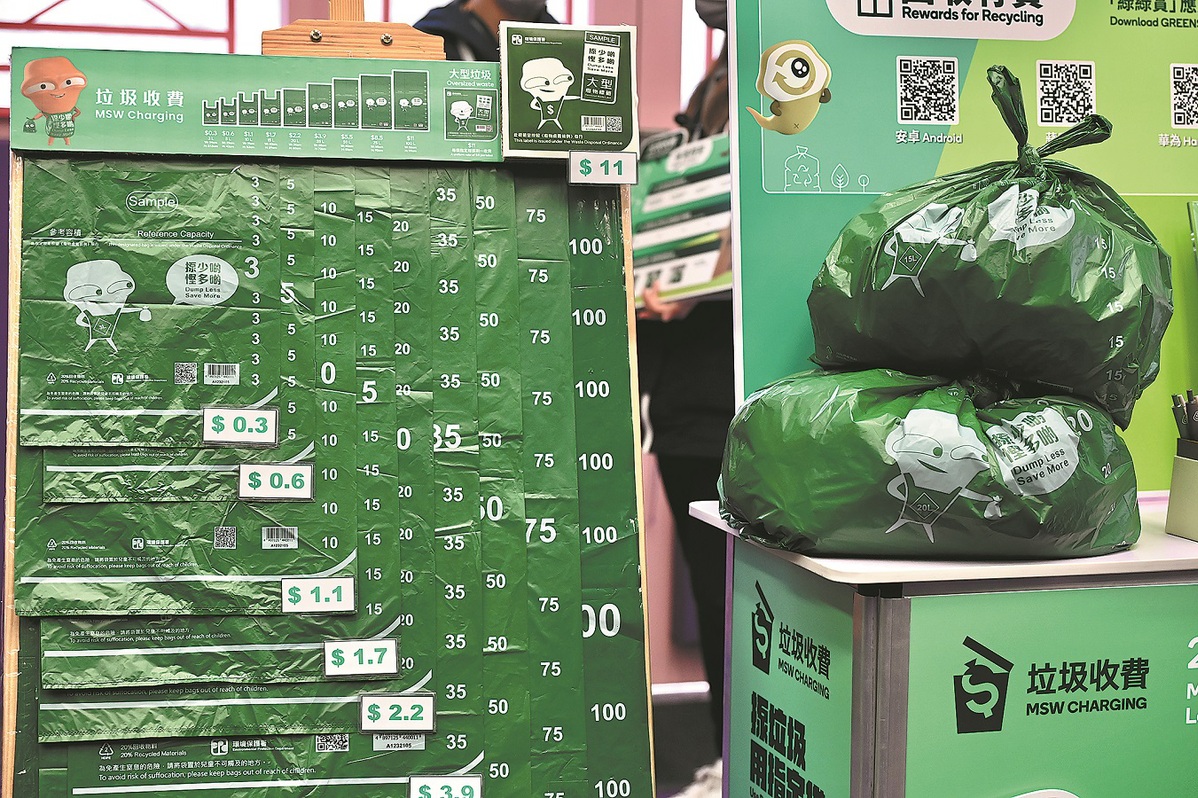
The designated bags for the Hong Kong waste-charging program. (LI ZHIHUA/CHINA NEWS SERVICE)
Restaurant leftovers
Hong Kong's catering industry, which deals with large amounts of food waste every day, is concerned about the extra costs involved with waste-disposal charges, given the sector's general slump. In March alone, an estimated 200 to 300 restaurants closed, according to industry figures.
"A 2,000-square-foot (185.8-square-meter) restaurant would incur an additional cost of HK$8,000-HK$10,000 per month just for purchasing the designated bags," said Winston Yeung, chairman of the Hong Kong Federation of Restaurant and Related Trades. A restaurant chain could spend up to HK$10 million a year on the bags, a figure Yeung described as "terrifying".
While there will be short-term economic pressures, he acknowledged that charging for waste disposal could benefit restaurants in the long run as they will be forced to optimize operations and reduce food waste.
He suggested that the government prioritize education about the program and encourage reducing the amount of food waste, rather than solely relying on charging fees.
In a citywide survey conducted a few weeks before the shelving of the program, less than half of the respondents said they knew the aim of the initiative was to reduce waste. Over 20 percent believed the program was being introduced to increase government revenue.
Lawmaker Chan Hoi-yan, who organized the survey, said the existing facilities were inadequate for the program's implementation. "People just feel robbed," she told reporters.
Lawrence Iu Chun-yip, executive director of Civic Exchange, a Hong Kong-based think tank focusing on environmental challenges, said it was important to reverse the public's perception that waste charging was being introduced simply to impose fines.
Iu said the communication gap between the HKSAR government, industries, and the public, which was exposed during the program's trial run, had prevented waste charging from being implemented in recent years. As the initiator of the program, the government needs to take more responsibility to promote it in different sectors, he added.

A cleaning worker sorts waste at the Lockhart Road refuse collection point in Wan Chai on May 27. (ADAM LAM/CHINA DAILY)
Enforcement 'the key'
Jonathan Wong Woon-Chung, professor emeritus of biology at Hong Kong Baptist University, called on the government to implement the waste-charging program as soon as possible.
He said the city's limited progress in waste recycling was due to people's longstanding reliance on the government handling trash. Legal enforcement of the new program is the quickest way to change people's mindsets and habits, Wong said, adding "imperfect" regulations should not be used as an excuse to further delay the implementation of the program.
He cited the South Korean capital Seoul as an example of what can be achieved through such a system. Seoul has introduced a volume-based waste charging system, which has reduced waste by one-third since it started in 1995.
"Hong Kong cannot afford more delays in waste management as the city is running out of landfills," Wong warned.
Yeung, from the restaurant federation, said eateries could reduce the number of prepaid bags they would need by recycling their food waste. However, he added there are not enough facilities to process the city's massive amount of kitchen waste.
The city has around 18,000 eateries. But to date, the government has established only 80 food-waste recycling points, which falls far short of the restaurants' needs, Yeung said. Small eateries also lack the manpower to recycle food waste on their own, he added.
The government should team up with private waste collectors to sort and transport restaurants' kitchen waste to better prepare catering businesses for the introduction of waste charging, he said.
The federation has long coordinated with recyclers to help restaurants deal with food waste, glass bottles, and cardboard, Yeung said. It has also cooperated with suppliers to cut packaging materials.
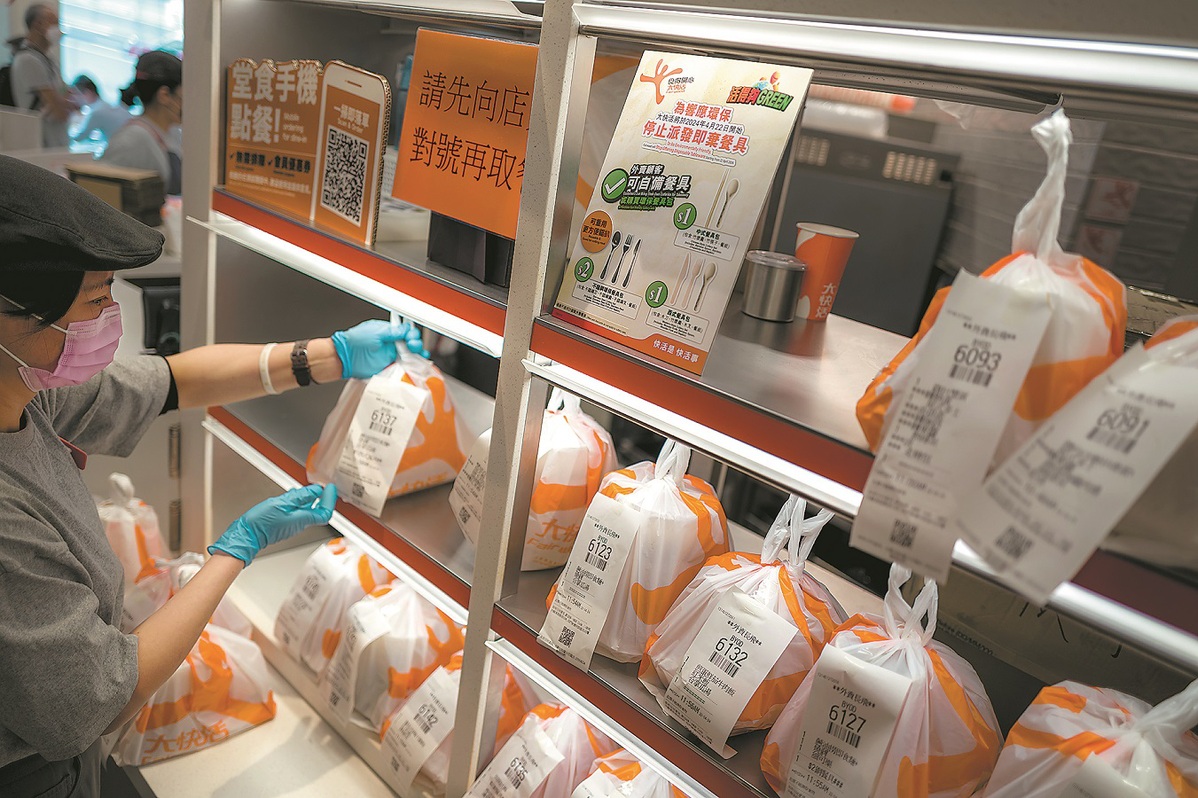
A staff member checks takeaway orders for customers at a restaurant in Admiralty on April 22. (ANDY CHONG/CHINA DAILY)
Progress on plastics
The setback in waste charging has not deterred Hong Kong's long-term pursuit of waste control.
The city began the first phase of its ban on single-use plastics on April 22.
Restaurants are banned from offering nine types of products made of expanded polystyrene — a nonbiodegradable material — such as cutlery, straws, plates, cups, and lids, as well as food containers.
Cotton buds with plastic parts, umbrella bags, and many other single-use plastic products have been removed from shop shelves. Hotels are not allowed to offer plastic-handled toothbrushes and combs, shower supplies packed in plastic containers, and free plastic bottles of water in rooms.
Yeung said replacing plastic tableware with eco-friendly materials is expected to lead to additional costs of 20 to 30 percent for restaurants. A six-month grace period set by the government allows restaurants to gradually replace their plastic products without facing harsh penalties, a measure that Yeung described as "very reasonable".
The city's Environment Bureau said in May that of 7,000 restaurants it had inspected, over 70 percent had fully switched to nonplastic products. Over 90 percent of the 5,000 retail shops and hotels bureau officials visited were complying with the ban.
Iu from Civic Exchange applauded the plastic ban, saying it had sent a strong message to residents and tourists about Hong Kong's commitment to waste reduction.
Alternative measures
Hong Kong is also looking at new waste-management methods to get rid of its dependence on landfills.
The Integrated Waste Management Facilities Phase 1, currently under construction near Shek Kwu Chau, an island in the south of Hong Kong, is expected to commence in 2025. The facility will have the capacity to incinerate 3,000 metric tons of municipal solid waste (MSW) per day, the equivalent of about 30 percent of the waste generated in Hong Kong per day.
The government is also planning the development of the Integrated Waste Management Facilities Phase 2, which will have the capacity to process about 6,000 metric tons of MSW per day.
However, Wong from Hong Kong Baptist University, said it's a pity that recyclable resources are being incinerated. He believes there should be a tiered process for waste processing, starting with reduction at the source, followed by reuse and recycling, then incineration, with landfill as the last resort.
Hong Kong's rate of waste recycling is still far behind the average of 60 percent achieved in many European cities. To address the problem, the government should boost the circular economy to give waste more economic value, he said.
Cooperating with other Guangdong-Hong Kong-Macao Greater Bay Area cities is another way for Hong Kong to manage its waste, Wong said. The neighboring cities could help Hong Kong process waste and manufacture products made from recyclables.
There was also scope to develop recycling-related technologies, such as converting plastic waste into petroleum, he said.
In addition to the government's efforts to reduce waste, the city's residents are taking small steps themselves to make a difference.
A group of coffee shops launched an initiative on the internet similar to a library lending out books that are returned. Customers are offered reusable coffee cups that can be used at coffee shops that join the network.
The system has gradually expanded from the Central and Sheung Wan districts on Hong Kong Island to Kowloon, the New Territories, and even Lantau Island.
Photos
Related Stories
- First cross-broader electric coach linking Hong Kong and Shenzhen starts operation
- Extraterritorial application of HK national security law conforms to int'l law: spokesperson
- Report deems Hong Kong world's 5th most competitive economy
- Hong Kong Investment Corporation announces new strategic partnership in AI
- 38th International Travel Expo to open in Hong Kong
- Explore Hong Kong Science Park, where startups thrive
Copyright © 2024 People's Daily Online. All Rights Reserved.







